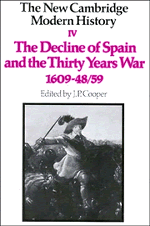Book contents
- Frontmatter
- INTRODUCTORY
- THE CENTRAL CONFLICTS
- Chapter IX Spain and Europe 1598–1621
- Chapter X The state of Germany (to 1618)
- Chapter XI The Thirty Years War
- Chapter XII The Low Countries
- Chapter XIII Sweden and the Baltic 1611–54
- Chapter XIV International relations and the role of France 1648–60
- THE UNMAKING AND REMAKING OF STATES
- THE FRONTIERS OF EUROPE
- References
Chapter IX - Spain and Europe 1598–1621
from THE CENTRAL CONFLICTS
Published online by Cambridge University Press: 28 March 2008
- Frontmatter
- INTRODUCTORY
- THE CENTRAL CONFLICTS
- Chapter IX Spain and Europe 1598–1621
- Chapter X The state of Germany (to 1618)
- Chapter XI The Thirty Years War
- Chapter XII The Low Countries
- Chapter XIII Sweden and the Baltic 1611–54
- Chapter XIV International relations and the role of France 1648–60
- THE UNMAKING AND REMAKING OF STATES
- THE FRONTIERS OF EUROPE
- References
Summary
When Philip II's long reign came to a close, his Mediterranean policy had largely succeeded. He had defeated the Turks and closed his grip on Italy. But his northern policy had failed. He had not defeated the Dutch ‘rebels’. The vast enterprises into which he had been tempted by the hope of quicker victory had been disastrous. His treasury was empty. And now the favourable conjuncture which had lasted so long, and which he had hoped to exploit, was over. For most of his reign Phillip II had profited by the division and anarchy of France. But by 1598 that was past: the new Bourbon dynasty was firmly established and could not even be rejected as heretical. In his last year, therefore, Philip II came to terms with reality. Since the Netherlands would not yield to him, he ostentatiously devolved his authority over them to an ‘independent’ sovereign, his own safely Spaniolized son-in-law, the Archduke Albert; and he allowed this sovereign to negotiate, in his name, peace with France.
Thus the dying Philip II laid down the policy which his son Philip III should follow. Through the Archduke Albert he was to continue the northern struggle. The ‘rebels’ in the Netherlands were to be crushed. The war with heretical England, however disastrous, should be continued: after all, the succession to the English throne was still open and Elizabeth's death, when it came, would offer a great opportunity. But on the landward side the archduke should be undistracted. There was no point in continuing the war with France.
- Type
- Chapter
- Information
- The New Cambridge Modern History , pp. 260 - 282Publisher: Cambridge University PressPrint publication year: 1970
References
- 2
- Cited by



